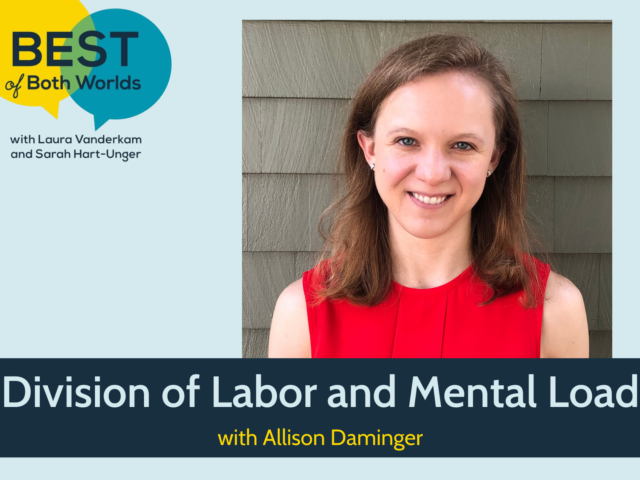Many years ago, I read an article that was pointing out the difficulty of trying to share domestic tasks equally. A husband and wife might agree to take turns calling babysitters, the author wrote (this was back when people used the telephone as a phone). But who knew when babysitters needed to be called?
This “mental load” part of the equation is trickier. Today’s Best of Both Worlds guest, Allison Daminger, has built her research career studying this equation. As a PhD candidate in sociology and social policy at Harvard, she’s been asking couples to keep track of their days (time log alert!) and then to talk through the various decisions. Sometimes these decisions are obvious and consciously made (which school are we sending our kids to?). Sometimes they are less obvious (what constitutes an acceptable breakfast?). But understanding who does what can offer a lot of insights into family life, and into the cultural narratives that often dictate less-conscious decisions.
Allison finds that unlike the stereotypical 1950s dad, most modern fathers are intensely involved in their children’s lives. However, the female partners in heterosexual couples are still more likely to be making decisions about children and the household in general. This cognitive load has its cost. If you’re always thinking about what’s for dinner, you might not be writing that novel, developing that new product, launching that business…
Simply being aware of the decisions — so they aren’t made invisibly — can help. Allison also suggests vertical ownership. Don’t just assign someone to make a dentist appointment. Someone owns all dental care. This way people can truly make decisions with all the context, and the other party can just stop worrying about it. Or at least they should! Gatekeeping happens. But dividing ownership can help with equity.
This is a fascinating interview. In the opener, Sarah and I do a mental load/division of labor poll about our households. Some is pretty stereotypical (I make the childcare schedule…my husband deals with the yard and gutters and such…) though we have some other less-traditional splits. He does the majority of our grocery shopping and as such is mostly in charge of inventory management. Given his perfect teeth and my…not so perfect dental health…he is in charge of all things tooth related in our household.
In the Q&A section we answer one of our most common questions — how to find and hire a good nanny. Please give the episode a listen and as always we welcome ratings/reviews.
For our listeners in two-adult households, how does your family split the mental load? Do you have any “non-standard” divisions?

I loved this episode. We have a super equitable distribution of labour, perhaps about to skew dramatically in my favour as I take on a job in another city. I subscribed to Allison’s newsletter and her discussion of individual and systemic solutions really hit home with me – the joint email address, not assuming that the mom is in charge of everything etc. Really thoughtful stuff, and I appreciated the academic approach.
This was a great interview! In my house the split is maybe a bit unusual in that my husband does about 95% of the food—that includes meal planning, grocery shopping, cooking, and most of the dishes. He’s also heavily involved in childcare.
However, I still do all of the laundry and “mental load” type things—scheduling childcare and all appointments for everyone in the family, home/car repairs and maintenance, supplies and clothes, finances, etc. I think it works out okay because I hate grocery shopping and he loves to cook. I think there’s just so much that goes into running a household. ! I found the Q&A to be quite validating—that you both have full-time nannies.
Thanks for the great podcast.
We re-visited the split of tasks when I returned to work after our 1st child. The biggest change we made is that my husband does the grocery shopping and contributes more to meal planning. Before I meal planned, shopped and cooked and it was just too much after returning to work. He also does all of the cleaning in our house because he does not want to re-hire a house cleaner (we had one pre-covid, then stopped during the pandemic as they send a team of 3-5 people so it didn’t feel super safe). So I said we hire someone or you do it, and he opted to do the cleaning. 😉 He also does way more daycare drop-off/pick-up because he goes into the office 3-4 days/week and it’s on his way.
Super interesting episode. I plan to subscribe to her newsletter!
@Lisa – very wise to renegotiate roles after a baby, since it’s amazing how much baggage we all come to parenthood with. Plus the babies make lots more work and introduce lots of new decisions — all of which have to be divvied up. When these choices are made mindlessly, they’re unlikely to be made well.